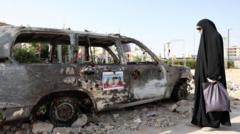President Trump's involvement in the Israel-Iran conflict has led to a tentative ceasefire, but both nations remain on edge. While the U.S. aims for stability, the situation showcases the complexities of Middle Eastern dynamics.
Uncertain Ceasefire: Trump’s High-Stakes Diplomacy with Iran and Israel

Uncertain Ceasefire: Trump’s High-Stakes Diplomacy with Iran and Israel
As Trump negotiates a fragile ceasefire between Iran and Israel, the region holds its breath amidst a tense standoff following military strikes.
The past week marked a pivotal moment in U.S. foreign policy as President Donald Trump interjected America into the escalating conflict between Iran and Israel, leading to a tentative ceasefire announced on Monday evening. Trump heralded this ceasefire as a potential precursor to lasting peace, labelling the hostilities a "12 Day War." However, the situation remains volatile, with the ceasefire’s durability still in question following U.S. airstrikes on Iranian nuclear sites over the weekend.
Iran's Foreign Minister, Abbas Araghchi, articulated Iran's stance on the agreement, stating that if Israel refrains from aggression by the imposed deadline of 4 AM Tehran time, the nation would cease further military responses. The Israeli government appeared to acknowledge this, claiming to have fulfilled its strategic objectives with the recent operations against Iranian targets.
Nevertheless, the peace attempt was tested shortly after the deadline, as Israel's defense minister accused Iran of a ceasefire breach. Iran countered these claims, highlighting the fragility and underlying tensions surrounding the ceasefire’s viability. Trump’s administration is hopeful that such skirmishes do not derail diplomatic efforts.
The ceasefire was precipitated by a day marked by retaliation, where Iran executed missile strikes on U.S. installations in Qatar, which were reportedly intercepted without causing any American casualties. Trump declared Iran's response lacked seriousness, suggesting optimism for a de-escalation and a return to "Peace and Harmony in the Region."
In the wake of Iran's missile attacks, their approach appeared to prioritize proportionality rather than further escalation—a strategic choice supported by their prior notifications to Qatari authorities before the strikes. This context parallels previous military engagements initiated by Trump, such as the targeted killing of Iranian General Qasem Soleimani in 2020, which also saw restraint from U.S. forces afterward.
As the administration focuses on stabilizing oil prices and managing international perceptions, the overarching atmosphere remains precarious. If new Iranian provocations result in American casualties, pressure for a stronger U.S. response could mount significantly. For now, Trump appears to be pursuing a diplomatic route, emphasizing the importance of stability, as both nations contemplate the next steps in this delicate diplomatic balancing act.
Iran's Foreign Minister, Abbas Araghchi, articulated Iran's stance on the agreement, stating that if Israel refrains from aggression by the imposed deadline of 4 AM Tehran time, the nation would cease further military responses. The Israeli government appeared to acknowledge this, claiming to have fulfilled its strategic objectives with the recent operations against Iranian targets.
Nevertheless, the peace attempt was tested shortly after the deadline, as Israel's defense minister accused Iran of a ceasefire breach. Iran countered these claims, highlighting the fragility and underlying tensions surrounding the ceasefire’s viability. Trump’s administration is hopeful that such skirmishes do not derail diplomatic efforts.
The ceasefire was precipitated by a day marked by retaliation, where Iran executed missile strikes on U.S. installations in Qatar, which were reportedly intercepted without causing any American casualties. Trump declared Iran's response lacked seriousness, suggesting optimism for a de-escalation and a return to "Peace and Harmony in the Region."
In the wake of Iran's missile attacks, their approach appeared to prioritize proportionality rather than further escalation—a strategic choice supported by their prior notifications to Qatari authorities before the strikes. This context parallels previous military engagements initiated by Trump, such as the targeted killing of Iranian General Qasem Soleimani in 2020, which also saw restraint from U.S. forces afterward.
As the administration focuses on stabilizing oil prices and managing international perceptions, the overarching atmosphere remains precarious. If new Iranian provocations result in American casualties, pressure for a stronger U.S. response could mount significantly. For now, Trump appears to be pursuing a diplomatic route, emphasizing the importance of stability, as both nations contemplate the next steps in this delicate diplomatic balancing act.























